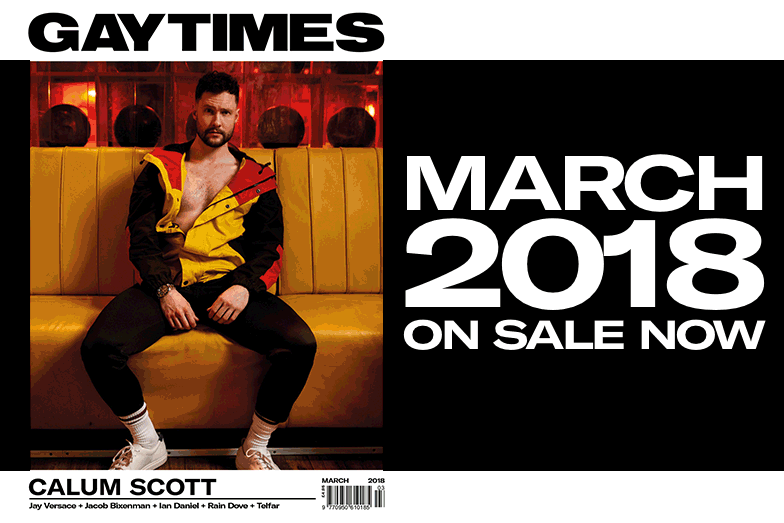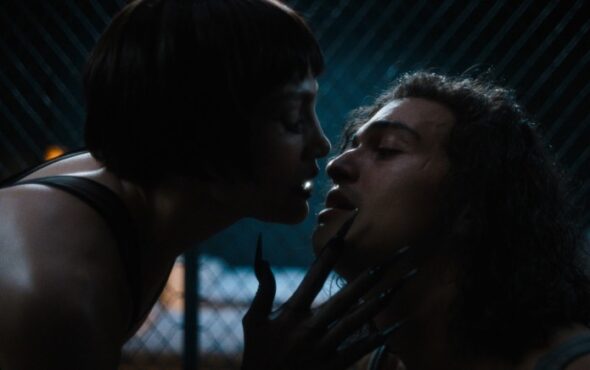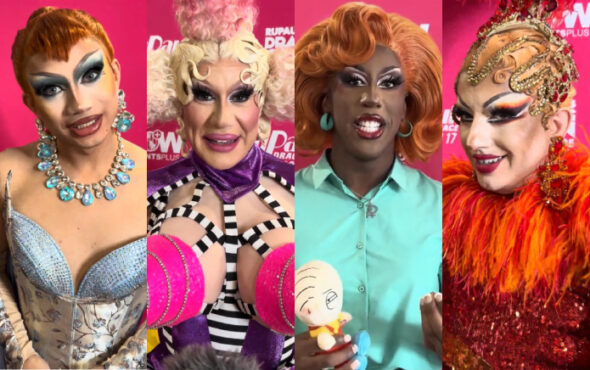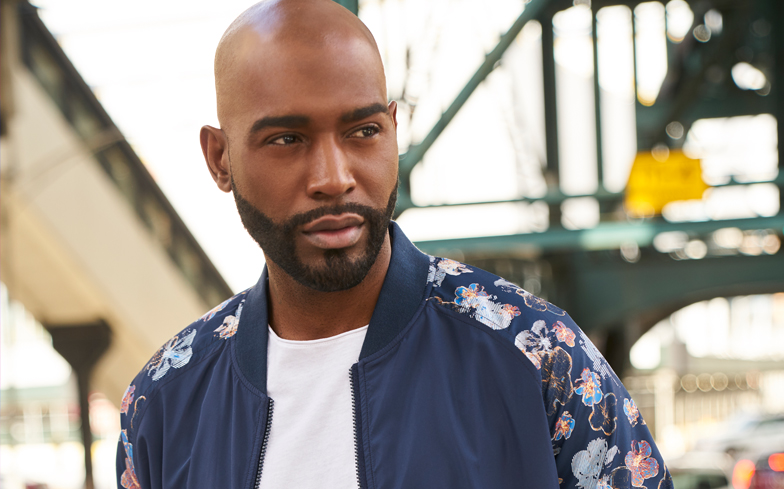
We sobbed. We laughed. We immediately went out and bought more avocados than we actually need. And that was after just one episode of the Queer Eye reboot, which premiered on Netflix last month.
The brand new Fab Five sashayed into our lives with eight new episodes of inspiring makeovers, heartfelt emotion, critical conversations, and plenty of fierce fun.
Mr. Culture, Karamo Brown, slightly tweaked his role for the revival, focusing more on being a life coach than getting people to the theatres. And it’s worked wonders for the format.
As a snowstorm whipped through London this week, Karamo touched down in the UK to visit the Houses of Parliament as part of a campaign with OutRight, helping to fight for human rights for LGBTQ all over the world.
Outside of reality television, Karamo has worked as a social worker with LGBTQ youth and launched the 6in10 organisation to help break down the stigma of HIV within the black LGBTQ community.
Gay Times caught up with the star to talk about the incredible response to the Queer Eye reboot, plans for a future series of the show, how the over-sexualisation of Pride marches is damaging LGBTQ youth, and why he absolutely hates dating apps.
Congratulations on the reaction to the new series of Queer Eye – you guys must be over the moon?
“We were all shocked of the warm reception from the straight community and the gay community. We were nervous. A reboot, people can sometimes say, ‘We hate it’. Luckily, they’re loving it.”
Were you ever apprehensive about the changes being made for the reboot?
“Those changes were important. Especially for me. I’m the only one who has done reality television out of the other guys before the show, so I made sure that we spoke about not trying to duplicate what they did before. It was just about being our authentic selves. Where gay people were in 2004 when the original show came out, is not where we are now. We had to make sure we were true to the community and I believe it worked.”
People have noticed that the workload feels slightly unbalanced when Bobby has to redecorate half a house and then Antoni teaches them how to make a salad. Do you guys laugh at those comments?
“We do! We know. This is not taking away from anyone because Antoni is an amazing cook and they didn’t show half of the real meals he cooked. He’d be in the kitchen for two hours cooking up something and then it gets turned into the avocado. But Bobby, poor baby, we would leave and he would be in there hammering until 2am. When it came to culture there was no defined role. The first time around Jay was a Broadway star and so he gave out tickets. My background is in social work and psychotherapy, so I wanted to more so be the one that fixes the inside, which people were apprehensive about. They let me go with it, which worked out. We all had difficulties in our own areas.”
Your role was more like a life coach.
“Yes! That was important to me. The first time around, they didn’t really address the inside. You can fix all the outside you want, but if you haven’t figured out why you go through those patterns, then you’re just going to regress. The first episode where I tried it, the producers were a little apprehensive. They were like, ‘Culture is supposed to be like going to a museum and a show,’ and I was like, ‘Not this time around!'”
As you’ve mentioned, gay people now are in a completely different place from where we were back in 2004 when the original show first started, so why is it important that Queer Eye is on our screens in 2018?
“Well, worldwide we’re regressing. People assume that just because in certain places LGBTQ people can get married, that all of a sudden they’re like, ‘Oh look we’ve got all our rights.’ But if you look across the board, there’s still so many countries that criminalise LGBTQ people just for being who they are. In some places you can’t set up an LGBTQ organisation because the government will dismantle it immediately. We’re talking about HIV/AIDS funding, or supporting trans people, the fact the government is against you is hard – even in America. We have a vice president who is adamant that he hates the gays, and is doing everything to remove us from the history books. It’s important that we show who we are holistically as gay men, but also that we start to help our allies understand that we still need their support. Also, gay people need to come together because we’re under attack.”
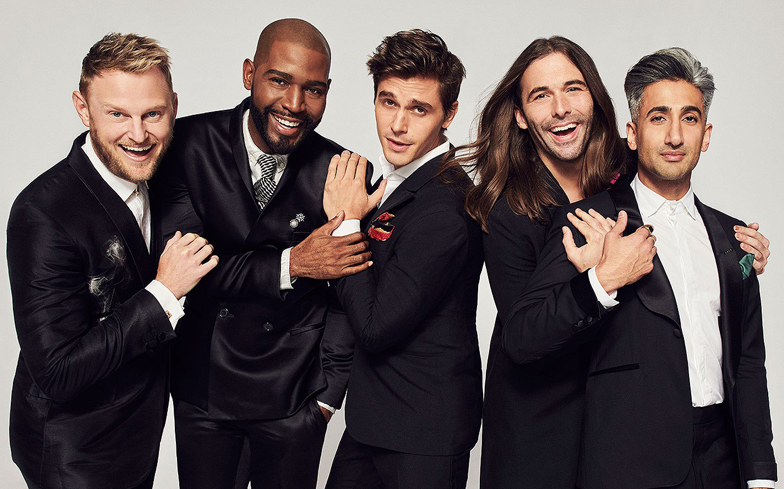
Netflix
One of the twists for the new series was that you branched out to helping a gay guy turn his life around. Why was the decision to step outside of the straight guy part of the format made?
“The first iteration was about, ‘Straight men don’t do anything – we have to fix their lives!’ But this time around, we were like, if we’re going to be experts in our field it shouldn’t just be limited to straight people. I was hoping we were going to do more LGBTQ people, but we ended up doing families and the firehouse. But still, it was important because a lot of LGBTQ people need assistance as well. AJ was a prime example. Successful, handsome, but was struggling with his own insecurity. He couldn’t come out, but luckily we were able to help him do that. If we get a second season, I’d want to immediately get women involved, and the trans community. Those are two things I’ve already sent to producers. All of the Fab Five have suggested it.”
It would be really interesting if you helped out someone who identifies as gender non-binary.
“Oh my gosh that would be amazing. That’s a conversation we don’t see. We are five gay men who have friends who are non-binary, so it’s important for us to start that conversation with the rest of the world. On social media, so many people have hit us up about that AJ episode and were like, ‘I didn’t know gay people still went through that.’ We’re like, ‘Yeah, a lot of gay people still have to navigate and figure out how to live in both identities.’ Like, your work world where you’re scared if something happens because you’re out, and then with your friends and family.”
AJ’s episode in particular had the biggest emotional punch.
“It did. One of the things that got cut out – which I’m going to give myself a pat on the back for – is that I was the reason why AJ wrote that letter. I was really hoping it would give him the cathartic moment that it gave him. He and I have talked since then, and he was like, ‘That changed my life.’ But y’know, when you hide yourself for so long, of course it’s like you’re releasing and it’s going to make you a better person.”
This series of Queer Eye has been praised for tackling political and social issues, most notably your conversation with Cory around the mistrust between the African American community and the police.
“The beauty of what the producers did this time around was they didn’t have us check our other identities. A lot of times, shows will say, ‘No, you’re the gay guy on the show so just be gay.’ I’ve been openly gay since I was in my teens, but I’m also a black man. Being an African American comes with its own pressures and issues. So first of all getting stopped by the police, then walking into a house where I see Trump-Pence up who have been against people of colour, against gay people, I was like, ‘We can’t go any further until we address the elephant in the room.’ I was happy because the producers didn’t cut it. They didn’t stop the conversation. So many have talked to me on social media and said, ‘I didn’t know what it was like for people of colour when you get stopped – the fear, the anxiety – but now I understand.'”
You’ve mentioned the editing process a few times, and the show is largely edited in a positive light, but were there any moments that were challenging that we didn’t get to see?
“I would say you saw a hundred percent of what we were feeling. When you see us in the confessionals, if we were uncomfortable, we’d normally say it. I think we were nervous about Neil – the bearded Indian man – because he was so closed off from emotion. We’re all super affectionate. We thought it was going to be a challenge, but it took us a week to get him to open up.”
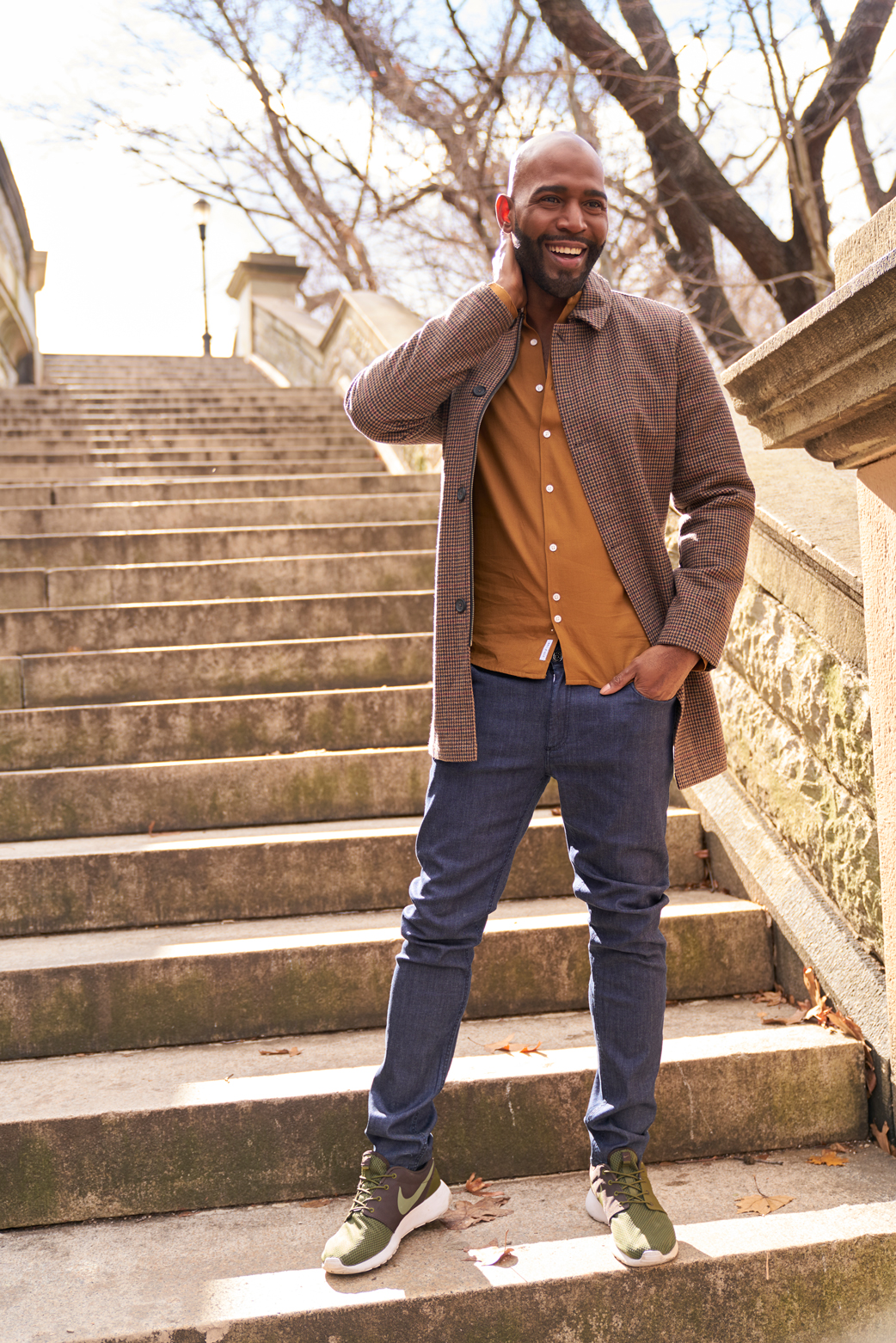
Image: Zach Alston / Stylist: Raven Roberts
You helped a few of the guys on the show sort out their dating game, so what is your top tip for the perfect first date?
“Don’t go to a restaurant, and don’t go to the movies. You need to go somewhere that is one-on-one and intimate. I’d also say, do it daytime. We always think we should meet up at night, but I’d say your lunch break. I say that because, a lot of the time at night we give our best selves, then what happens, a month into the relationship you’re like, ‘Oh that’s not the person I met that night who did all of the glitz and glam.’ Give them the real you from the beginning. For instance, you’ve had a busy day coming here, so someone would appreciate knowing, ‘Oh his days, because he’s a journalist, sometimes include busy days…’ It helps them understand what they’re getting themselves into.”
How do you think dating apps are affecting the gay community?
“I think they’re the worst. I think they’re horrible. I do not own an app and never have. I think dating apps are keeping us apart. It’s also over-sexualising the community. A lot of gay guys are already over-sexualised because we go through a second adolescence when we come out. We decide we want to go balls-to-the-wall and engage with other men. But after a while you grow out of that and when you talk about the apps that we have, they usually encourage, ‘Send me a photo,’ which is very vague. My photo has nothing to do with the person I am, the dreams I have, the family I want to build, the family I’m from. We’re in a culture now where, if I don’t like you, I don’t have to get to know you, I just have to swipe left. How horrible is that? I don’t think my grandparents or parents would have met if they had these apps. So I say, get off the apps and go to the club. Meet people. It’s much more fun. If you want to hook up and just get your nut off then go on apps.”
There’s also the problem of prejudice being dressed up as preference, where ethnic minorities are discriminated against and even subjected to racism when they use these apps. What advice would you give to guys who are victims of this type of behaviour?
“See, that’s another one of the downfalls of this technology. I have a lot of friends who come to me who are Asian, black, feminine, or fat, and they’re like, ‘Do I say something back?’ I’m like, ‘Well, it’s an anonymous person. You can’t get to someone’s core and help them understand their hurt when you’re not face-to-face with them.’ People need to understand that it’s hurtful for someone to see, ‘I don’t like you because of something you can’t control.’ So I usually say to people, if you’re going to engage in that, it’s one of things where you’re basically saying I’m okay with this type of ugly behaviour. If you’re not okay with it, let’s stop. I’ve actually sent letters to different app developers protesting this exact thing. They always say back, ‘We can’t control that.'”
Do you not think a name-and-shame system would work where their profile would indicate that they have been reprimanded for discrimination towards other users?
“I suggested that with one of the very popular apps, and they were very great responding back. But they said they can’t do it because, say for instance, I’m just talking to you but I don’t want to have sex, but then you give me a strike. There’s no way to really quantify if that’s the truth or not. So it’s hard to say that. That’s the online world that we live in. It’s like trolling – if you’re going to go on social media, be aware that people are going to send you ugly messages. They’re going to have no profile pic. Some people, they get off on that. So it’s really making sure you engage outside of those things.”
Do you think these apps are a phase, or are we stuck with them?
“I think everything is a pendulum. We’ve been in about an eight-year swing of this, but I think this next generation is going to swing us back into the middle. Again, it’s great for hooking up, but I can’t tell you the last time I met a couple who said, ‘I met on Grindr or Scruff, and I’m in a long term relationship.’ It just does not happen.”
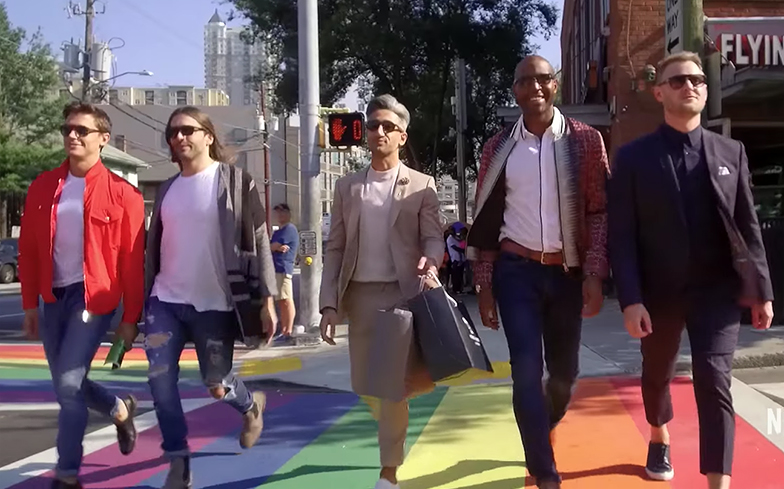
YouTube / Netflix
Before Queer Eye you worked as a social worker at the Los Angeles LGBT Center, so from your experience, what are the biggest challenges that face today’s LGBT youth?
“It’s several. There’s not one that’s the biggest because it depends on the person, but I’d say being over-sexualised. Our youth are over-sexualised and it’s so sad. You think about Pride celebrations; I’ve never been able to bring my own children – except for maybe once or twice – or the youth I used to work with to Pride celebrations, because for them to be walking down the street to be learning what it is to be a proud member of this community, and then see dicks out… that’s just not healthy for a 15-year-old. What image does that send out about what you have to do? It affects your body image, it affects your view of the world. I’m by no means – because I love a shirtless selfie – taking away from someone’s right to do that. But as a community, we’ve forgotten that there’s a generation behind us that are watching. That are mimicking what we do and what we say.
“Especially when I think about being African American, the people who came before me, I don’t remember a Black Pride festival where people were naked. It’s always about honouring our ancestors and being proud of the accomplishments they’ve made, and wearing African-inspired garbs. No-one’s walking around naked. But for some reason, in the LGBTQ community, that’s our moment to be free and the most naked we can be. I’m with it, because I’m an adult, but there’s kids watching.”
It’s almost like the Pride march needs to return to being a political act, and the celebrations can happen in the clubs later on.
“Exactly. But it’s our fault as a community, and I’m including myself in that. I’m a grown man and I love seeing go-go boys on a float. Cannot lie to you. I’d be a hypocrite if I said I did not. But I’m also cognisant that because I’m making this choice to say, ‘I’m going to come out here,’ I can no longer bring my kids who are 21 and 17 because I don’t want them to think that this is what represents the community. I get embarrassed. On the latest season of America’s Next Top Model they had an episode where they go to Los Angeles Pride, and the shots are of these go-go boys with their dicks out and people grinding on each other, and I was like, ‘Oh my gosh – this can’t be the image this producer is sending out to middle America when they think about Pride.’ It’s so much more than that. It’s about our struggle, our journey, our ancestors, how far we’ve come, and where we’re going.”
Would you say those images are validating some of middle America’s extremely prejudice views that all gay people are ‘sexual deviants’?
“That’s exactly what we’re doing, validating their issues. I can only equate it to the African American community where we’d be putting out images ourselves of violent crime movies. It doesn’t mean that crime doesn’t happen in every community, but that’s perpetuating a stereotype that’s already there. To a degree, we have images that show gay men, lesbians and trans people in a positive light, but I think the Pride celebration is something we could work on. Especially if we’re talking about it in the context of youth, who are like, ‘Oh this is what it’s like to be part of the community’. It’s not boo-boo. This is one day that you’re letting your hair down. What it means to be part of this community is so much bigger, brighter, better and beautiful.”
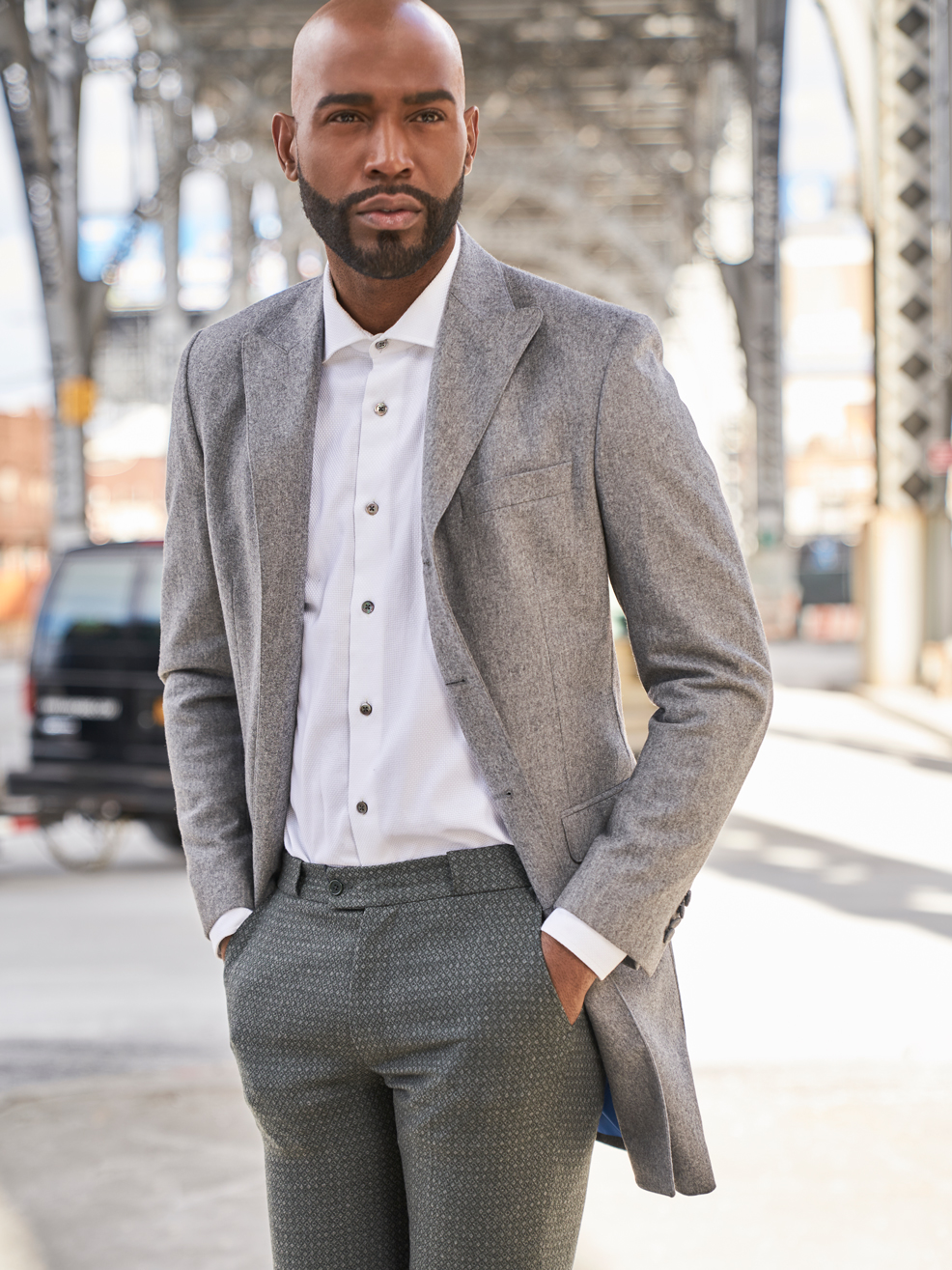
Image: Zach Alston / Stylist: Raven Roberts
Essentially, LGBTQ history needs to be part of the school curriculum for everyone to learn about.
“Yes! That is something that I’ve worked with different organisations to support. They’ve started incorporating it into the curriculum in California. It’s despicable that you can go through a textbook and not see any of our accomplishments. I think about my parents in the sixties when they were in school and there was no-one of colour in the history books. What does that do to your self esteem? What does that do to your mental health, not seeing yourself and not being valued? On my Instagram story the other day I posted something about trans history because we don’t talk about it enough – the trans pioneers who do stuff. We don’t talk enough about the intersex pioneers. These are things we should be discussing. It needs to be taught in school because both gay and straight people need to be learning this.”
We need to talk about the work you do with your 6in10 organisation helping to break down the stigma of HIV in the black LGBTQ community.
“The organisation started because there was a standard disease control report that six out of ten black gay and bisexual men contract HIV by the age of 40. Now, that is one in two. The numbers are just growing. For me, I realised it’s a mental health issue. It’s, ‘Why am I not willing to protect myself? Why am I not willing to disclose my status? Why are we not having these conversations?’ That rings true for all communities, but especially with these numbers among black people. So it’s getting to the core of these spaces where your mental health is affected, which are schools, churches and family. What we’ve been doing really well is working schools with guidance counsellors on how they can talk to LGBTQ people about HIV and AIDS, and really talk to them in a way they understand how it affects them. How someone saying to you in the middle of the night when you start hooking up, ‘Oh we don’t need a condom’. That’s a self esteem choice when you decide not to take care of yourself. It’s not about pleasing them, it’s about your mental health and wellbeing. So we’re working with churches and pastors and it’s going really well.”
In London, HIV diagnoses are falling, but one of the groups that hasn’t seen the decline is gay and bi men of colour, so it’s an urgent issue that needs to be addressed.
“Yeah, and a lot of that is systematic. When you think about the HIV/AIDS crisis in the early eighties and then what came after, it was white gay men who had access because they had the wealth to get the treatment and doctors. So marginalised communities didn’t have access, and that perpetuated. If you go back even further, people of colour didn’t have access to traditional health care. So when we look at why these numbers are dropping, we have to look at the systemic issues that are actually in place – that have always been in place – and I think it’s about people just encouraging them to understand that that does not have to be anymore. But you have to change someone’s heart and mind about that, and that’s what’s big for me. When you can change the way someone views the worthiness of their life, that is when they start taking care of themselves. That’s what’s important.”
You can stream all eight episodes of the new series of Queer Eye on Netflix, now.
